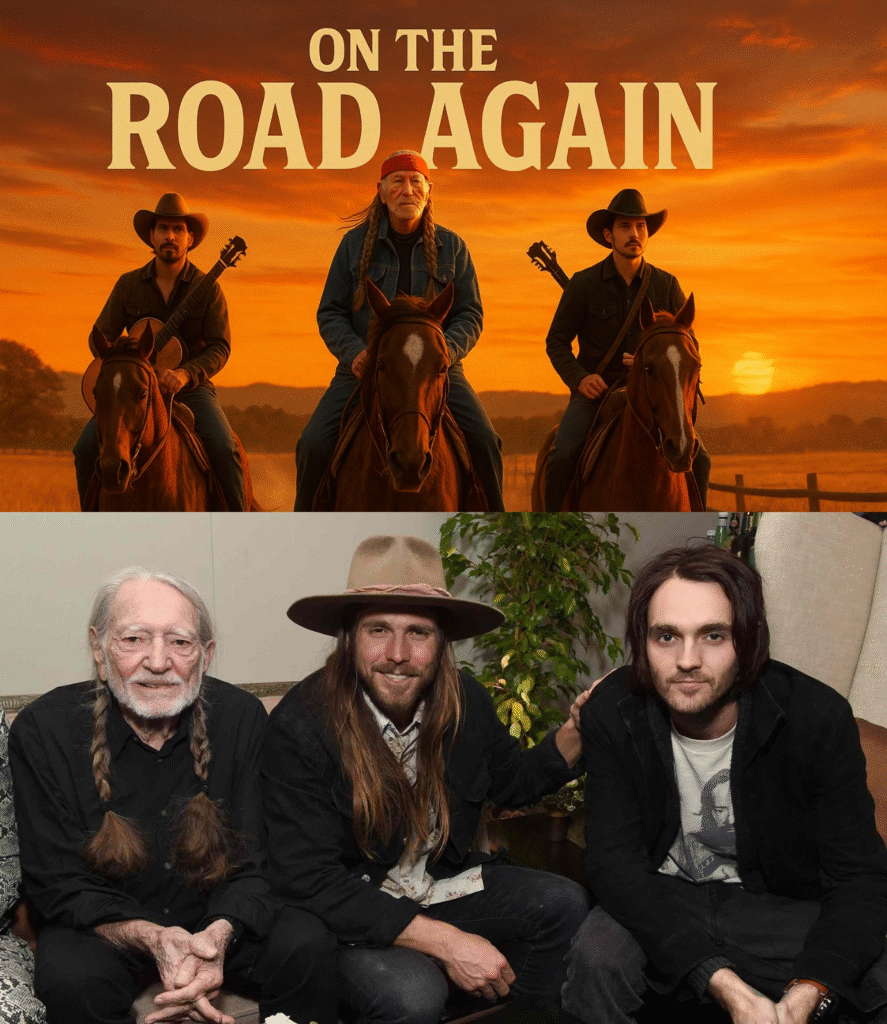
“On the Road Again: The Willie Nelson Story” — How a Country Legend’s Life Is Finally Hitting the Big Screen
For more than seven decades, Willie Nelson has been an outlaw, a poet, a rebel, and a saint — sometimes all at once. His story has been written in smoke-filled bars, highway miles, and the quiet corners of Texas nights. And now, after years of rumors, that story is heading where it belongs: to the silver screen.
The film, officially titled “On the Road Again: The Willie Nelson Story,” will chronicle the life of one of America’s most beloved musicians — from his humble beginnings in Abbott, Texas, to the global stages that made him the face of outlaw country.
For fans who’ve sung along to “Blue Eyes Crying in the Rain,” who’ve felt freedom in “On the Road Again,” and who’ve seen themselves in his rough-edged honesty, this movie isn’t just entertainment. It’s a long-overdue love letter to a man who helped define American music — and lived it with everything he had.
A Life Worth Telling
Born in 1933 during the Great Depression, Willie Nelson’s story reads like a folk song — hardship, heart, and hope rolled into one. Raised by his grandparents in a small Texas town, he picked up his first guitar at six and wrote his first song by seven. By the time most kids were learning arithmetic, Willie was learning how to bend words into truth.
He grew up working the fields, breathing in dust and diesel, dreaming about the radio voices that filled his nights. Country music wasn’t a career to him then — it was survival, a heartbeat.
After high school, he served in the Air Force, then worked as everything from a disc jockey to a Bible salesman before music finally gave him a calling he couldn’t escape.
“I always knew I’d end up singing,” Willie once said. “I just didn’t know where, when, or if anyone would care.”
They cared. The world cared.
Nashville Rejection, Texas Redemption
The film’s early acts will reportedly explore Willie’s time in Nashville during the late 1950s and early ’60s — years of rejection and frustration that nearly ended his career before it began.
Back then, Nashville was polished, proper, and conservative. Willie, with his tangled hair, restless spirit, and unconventional sound, didn’t fit the mold.
He sold songs that would later become classics — “Crazy” for Patsy Cline, “Night Life” for Ray Price — just to pay his bills. While others sang his words to fame, he remained an outsider looking in.
But the movie will also show what made Willie different: he never lost faith. When Nashville shut its doors, he packed up and went home to Texas — where his roots, and his rebellion, would finally bloom.
The Birth of the Outlaw
In the early 1970s, Willie Nelson helped spark one of the most important revolutions in country music — the Outlaw Movement.
Tired of the overproduced sound of Nashville, Willie and his friends — Waylon Jennings, Kris Kristofferson, and Johnny Cash — began making music their own way: raw, honest, and human.
They wore denim instead of suits, played honky-tonks instead of ballrooms, and sang songs that felt real. Willie’s sound — part country, part jazz, part folk, part blues — broke every rule and redefined the genre.
The film will likely capture this wild, golden era: the beer-soaked nights, the endless tours, and the birth of a brotherhood that would change music forever.
Out of that chaos came masterpieces: Red Headed Stranger, Stardust, Shotgun Willie. Each album was a piece of his soul, proof that freedom and art could coexist — even thrive — outside of the mainstream.
“I didn’t want to be what they told me to be,” Willie once said. “I wanted to be me. Turns out, that’s all people ever wanted.”
Love, Loss, and Life Between the Lines
But “On the Road Again” won’t just tell the story of fame and rebellion. It will dig deeper — into the man behind the legend.
Willie’s life has been marked by as much pain as triumph: failed marriages, financial ruin, and personal tragedy. The movie is expected to explore these moments with honesty, showing how his struggles shaped his humanity.
One of the most emotional chapters will likely revisit the loss of his son, Billy, in 1991 — a heartbreak that left Willie reeling but also deepened his compassion for others.
Those close to the production say Willie insisted that the film not glamorize him. “He doesn’t want to be turned into a saint,” one insider told Variety. “He wants people to see the cracks — that’s where the light got in.”
A Cast and Soundtrack Worth the Legend
Though casting details are still under wraps, early rumors suggest that a major Hollywood actor known for his quiet intensity has already signed on to play Willie in his later years. Producers are reportedly in talks with several well-known country artists — including Kacey Musgraves and Chris Stapleton — to participate in the soundtrack, reinterpreting some of Willie’s most iconic songs for the film.
Of course, Willie himself will contribute original music. In a brief interview from his ranch in Luck, Texas, he joked, “If they’re gonna make a movie about me, they’d better let me sing in it.”
The film’s director, rumored to be an Oscar-nominated storyteller known for emotional realism, described the project as “not a biopic — but a journey through the soul of America, told through one man’s eyes.”
The Heart of a Rebel, The Soul of a Poet
Willie’s life has always been about contradictions — the outlaw who preaches peace, the activist who still calls himself a cowboy, the sinner who never stopped believing in grace.
He’s campaigned for farmers, marched for justice, and sung for presidents and prisoners alike. He’s been broke, blacklisted, and nearly forgotten — but every time, he rose again, guitar in hand and smile in place.
That resilience — that unshakable, gentle rebellion — will be the heartbeat of the film.
More than fame or fortune, Willie Nelson’s story is about staying true when the world demands compromise. It’s about the courage to keep moving, to keep loving, to keep singing — even when the road gets rough.
Fans React
As soon as the project was announced, fans flooded social media with excitement.
“Finally,” one post read. “A movie about the man who made country music honest again.”
Another wrote, “If they don’t film part of it on his tour bus, I’m not watching.”
Across Nashville, musicians young and old celebrated the news. Many credited Willie with inspiring their own careers — not just through his songs, but through the way he lived: fearless, kind, and utterly himself.
The Final Word — From Willie Himself
When asked why he decided to say yes now, after years of turning down Hollywood offers, Willie smiled.
“I guess I’m old enough not to worry about what I do anymore,” he said. “If people see something good in it — something real — then it’s worth it.”
That’s classic Willie Nelson: simple, humble, and true.
At 91 years old, he has nothing left to prove. But “On the Road Again: The Willie Nelson Story” will remind the world why we fell in love with him in the first place — not just for his voice, or his words, but for the way he’s lived: honest, unfiltered, and free.
When the credits finally roll, the music will fade out on the same message that has echoed through every chapter of Willie’s life — that freedom isn’t about running from the world. It’s about walking through it with a song in your heart and kindness in your hands.
Because when all is said and sung, Willie Nelson isn’t just a country legend.
He’s the living proof that the road to truth — no matter how long or dusty — is always worth the ride.





